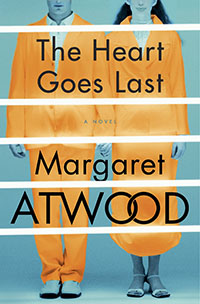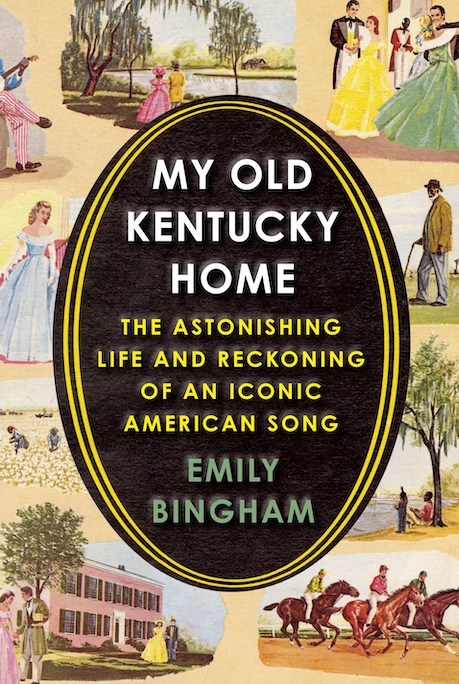A Safe, Cozy Prison
Margaret Atwood’s The Heart Goes Last ponders just how much security is worth
How much freedom should we sacrifice for security? And just how free does anyone really want to be? Those are the questions at the center of Margaret Atwood’s The Heart Goes Last, a novel that takes the very real ills and absurdities of the early twenty-first century—economic recession, for-profit prisons, gated communities, loss of privacy, technology-fueled narcissism, etc.—and gives them the signature Atwood tweak into the realm of speculative fiction. Unlike her dystopian classic The Handmaid’s Tale, The Heart Goes Last plays the scary stuff for laughs. The issues it takes on are serious, but the story itself is a sexy, bitterly comic romp.
 The unlucky protagonists of The Heart Goes Last are Stan and Charmaine, a young couple who’ve been slammed hard by the recession, which in their corner of the northeastern U.S. amounts to something like total economic collapse. Anyone with the means to do so has fled for greener pastures, taking all opportunity for recovery with them. When we first meet Stan and Charmaine, they’re sleeping in their car and living off day-old doughnuts, but homelessness is the least of their problems. Their real worry is the marauding gangs who prowl the night intent on rape and robbery. Theirs is a life of “frantic, grit-in-the-eyes, rancid-armpit wandering”—at least, that’s the way Stan sees it. Charmaine, a true believer in positive thinking, keeps despair at bay by saying things like, “Honey, let’s just cheer up!”
The unlucky protagonists of The Heart Goes Last are Stan and Charmaine, a young couple who’ve been slammed hard by the recession, which in their corner of the northeastern U.S. amounts to something like total economic collapse. Anyone with the means to do so has fled for greener pastures, taking all opportunity for recovery with them. When we first meet Stan and Charmaine, they’re sleeping in their car and living off day-old doughnuts, but homelessness is the least of their problems. Their real worry is the marauding gangs who prowl the night intent on rape and robbery. Theirs is a life of “frantic, grit-in-the-eyes, rancid-armpit wandering”—at least, that’s the way Stan sees it. Charmaine, a true believer in positive thinking, keeps despair at bay by saying things like, “Honey, let’s just cheer up!”
Despite their different temperaments, Stan and Charmaine share a certain timid conventionality. They’re the kind of folks whose instincts are to follow the rules and hope for the best, and so they’re poorly equipped to navigate a time of chaos. Charmaine, whose crummy job in a bar is keeping them in gas and doughnuts, is too afraid of the unknown to risk striking out for some more prosperous region. Stan, humiliated by unemployment, desperately wants to rescue the two of them, but he can’t bring himself to take advantage of his chief opportunity, which is signing on to his brother’s freelance criminal enterprise.
 They’re hopelessly stuck—until Charmaine sees an ad on the bar’s TV for the Positron Project. “We offer not only full employment but also protection from the dangerous elements that afflict so many at this time,” goes the pitch, accompanied by images of a gated community with tidy houses. Charmaine, who is not one to indulge in skepticism, is instantly seduced by the promise of fluffy towels and clean sheets, and she manages to get Stan on board in spite of a couple of daunting facts: that gated community, called Consilience, is actually part of a for-profit prison complex; and though inmates enter voluntarily, they can never leave.
They’re hopelessly stuck—until Charmaine sees an ad on the bar’s TV for the Positron Project. “We offer not only full employment but also protection from the dangerous elements that afflict so many at this time,” goes the pitch, accompanied by images of a gated community with tidy houses. Charmaine, who is not one to indulge in skepticism, is instantly seduced by the promise of fluffy towels and clean sheets, and she manages to get Stan on board in spite of a couple of daunting facts: that gated community, called Consilience, is actually part of a for-profit prison complex; and though inmates enter voluntarily, they can never leave.
Once inside Consilience, Stan and Charmaine’s dream of comfort and safety soon turns sour, to put it mildly. The Positron Project is hardly the benign experiment they’ve been led to think, and the dangers of the wasteland outside are more than matched by the unforeseen threats inside this seeming refuge. Worse yet, Stan and Charmaine—especially Charmaine—discover their own shadow selves and begin behaving in ways they never imagined they could.
If this all sounds grim, it is, and particularly so given how closely Stan and Charmaine’s world mirrors our own. But Atwood has a genius for goosing horror into razor sharp comedy, as she did in the MaddAddam trilogy, and she never misses a chance for a laugh in The Heart Goes Last. Elvis impersonators, malfunctioning sex bots, and pee jokes all get extended play here. And speaking of those sex bots, this book is rich in copulation of many kinds. Questions about who’s doing whom and why drive the plot pretty much from start to finish. But none of the foolishness wanders far from Stan and Charmaine’s terrible predicament, and the absurdity Atwood finds in a world where two nice people can volunteer to become prisoner-slaves (and worse) only heightens the book’s power to unsettle.
The Heart Goes Last began life as a serial for Byliner, and it retains some of the wonderful momentum of a serial—that rising-tension-to-cliffhanger rollercoaster effect. More than in any of her previous novels, there’s a sense that Atwood is writing primarily to entertain herself. The book has an air of spontaneity or improvisation but nevertheless delivers a satisfying sense of loose ends neatly tied, at least in terms of plot. It offers no pat answer to the freedom-versus-security question. Readers are obliged to grapple with that dilemma right up to the very last page.

Maria Browning is a fifth-generation Tennessean who grew up in Erin and Nashville. A graduate of Mount Holyoke College, she has attended the Clothesline School of Writing in Chicago, the Moss Workshop with Richard Bausch at the University of Memphis, and the Sewanee Writers’ Conference. She lives in White Bluff.


